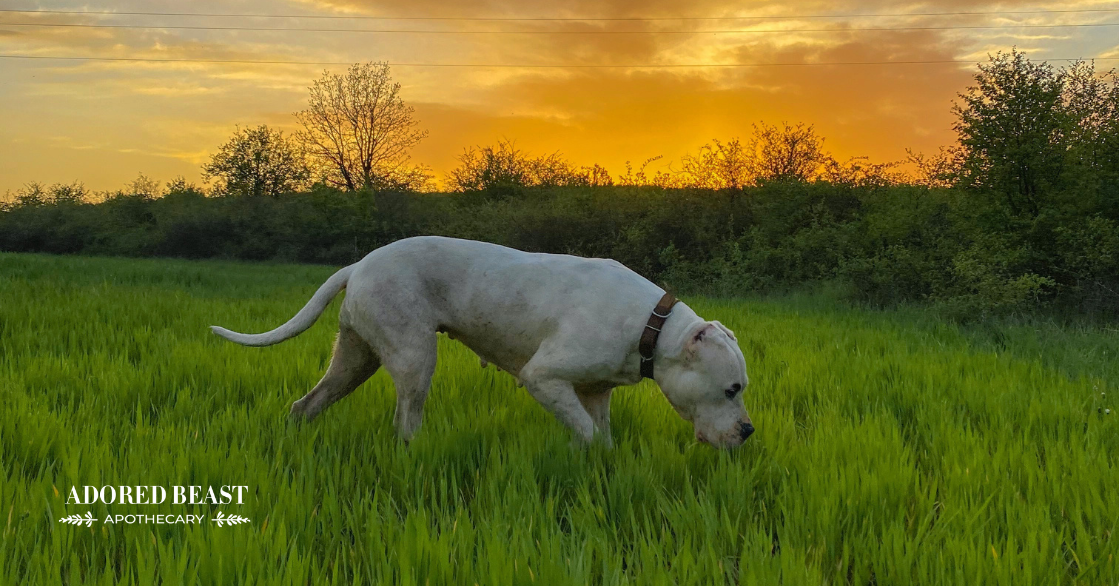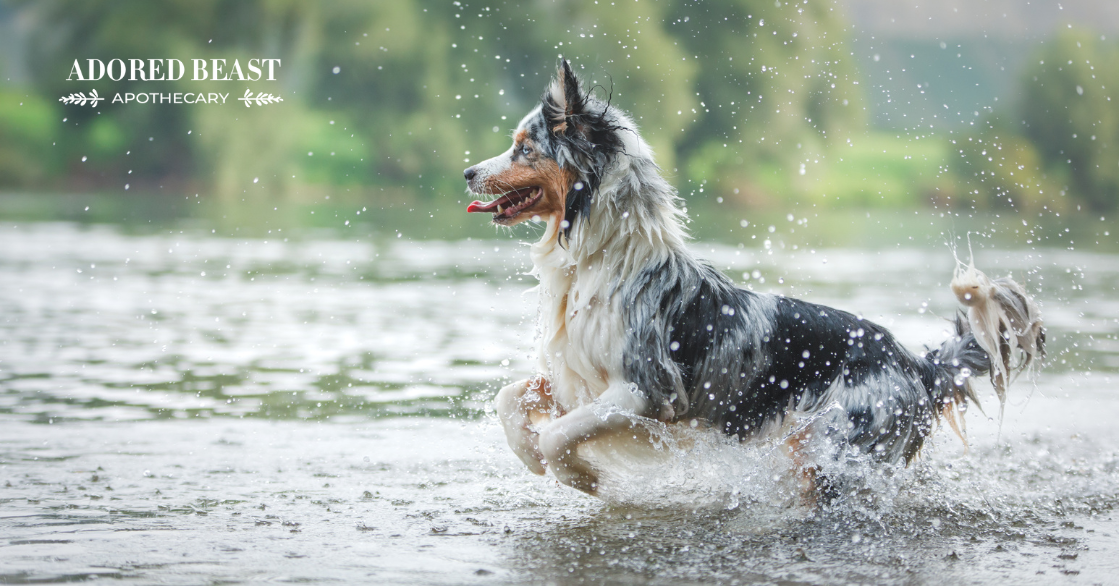We’ve all seen it: we’re out on a walk or playing in the backyard, and our pup stops and starts munching away. Lots of dogs do it, and while many of us immediately turn our minds to one specific reason, there are actually several different reasons for the behaviour…
So, why do dogs eat grass?
Is it really a sign that their tummy is upset? (Even though I know better, that’s where my brain always heads first!) Is something missing in their diet? Or does it just taste good?
Could it be all of the above?
This week, we’re wading through the weeds and getting down to the nitty gritty about grass eating.
Why Do Dogs Eat Grass?
So, what’s with the grass snacking? Let us examine the many reasons…
1. Tummy Trouble?
You probably assumed this one would be on the list. It’s true, some dogs eat grass when their stomach is upset. There’s something (experts can’t pinpoint exactly what) about grass – the texture maybe? – that, when eaten in large quantities, can lead to vomiting. And dogs seem to just “know” this. That could be why your dog heads out, eats grass, then sooner or later it comes back up…
But that’s not the only reason… in fact, studies show that less than 25% of dogs vomit after eating grass, and only 10% of dogs show signs of illness prior to eating grass. So, the majority of grass-eating dogs are not sick beforehand and do not vomit afterwards.
2. Find Fibre
Your dog needs fibre in her diet, and grass is actually a decent source. Some dogs eat grass to fill that void. A lack of roughage can affect your dog’s ability to digest food and pass stool. Eating grass may be what the body needs to help functions run more smoothly.
3. Help With Digestion
If a dog knows they are lacking enzymes paramount for digestion they may be consuming the green stuff to help support them with this system. If the diet is lacking, (ex. no natural enzymes) then perhaps try digestive enzymes to help with nutrition break down and absorption to be sure they are getting all the value from their food. You can read more on digestive enzymes at this post!
4. Beat Boredom
Grass eating is also thought to be an activity brought on by boredom. If your dog occasionally grazes when they’re looking for something to do, consider finding a new activity to get that mind working. Toss a frisbee around, go for a walk, or play a game of hide-and-seek!
5. Good for the Gut
Not only is grass a good source of roughage, it also contains prebiotics, which help encourage the growth of probiotics in the gut! And we all know that good gut health is important for overall health!
6. Tempted by the Taste
The last reason is that our dogs could simply just like the taste of grass or the act of chewing it! Sure, maybe it’s not something we’re going to start adding to our salads, but then, for most of us, neither is tripe!
When is Grass Eating a Concern?
Sometimes it can be a little bit difficult to determine if grass eating is something you should worry about.
But there are a few key indicators.
1. How often does it happen?
The occasional round of grass eating followed by vomit isn’t too concerning (make sure there isn’t something else going on). And by occasional, we mean very infrequent – maybe a few times a year at most.
However, if your dog eats grass regularly/frequently, and tends to vomit afterwards, scheduling a visit with your veterinarian may be in order. These grass-chewing episodes tend to be more urgent and frantic – all your dog can focus on is getting outside and eating grass until their stomach empties. In this case, you want to be sure that there isn’t some underlying issue that’s causing your dog to go to grass for relief. Ask your vet for bloodwork and talk to them about GURD or acid reflux and consider a more appropriate diet that is fresh and species-specific.
2. What kind of grass are we talking about?
If your dog seems picky about the grass she eats, specifically choosing tall broad grass along the fence line for example, that’s less concerning. New spring grass may also be attractive. And, if after a few bites, she moves on, she’s probably just because she wants to or because she’s seeking specific nutrients.
If, on the other hand, she does not care about the grass, just about getting enough in to accomplish the task of clearing out stomach contents, that might also be an indication that you need to investigate further with bloodwork and diet.
3. Is the grass contaminated?
This is always a concern – and it should be – no matter the reason for the grass eating. If your dog is eating grass, be it in the backyard, in the park, or along the sidewalk, always make sure that it is not treated grass. Any toxic pesticides sprayed on grass will make their way into your dog’s body, and that’s not a good thing! When walking we can never be sure what yards or parks are treated, so we tend to discourage grass eating except in our yard, or yards of those we know. If you dog is really a natural grass eater you can grow a patch in your backyard or on your balcony and allow them short times to munch away.
Why do dogs eat grass? The bottom line is, grass eating is normal canine behaviour, and not often something you should worry over. A few blades here or there could just be a way to break up the daily routine, or to get a little more fibre in the diet.












